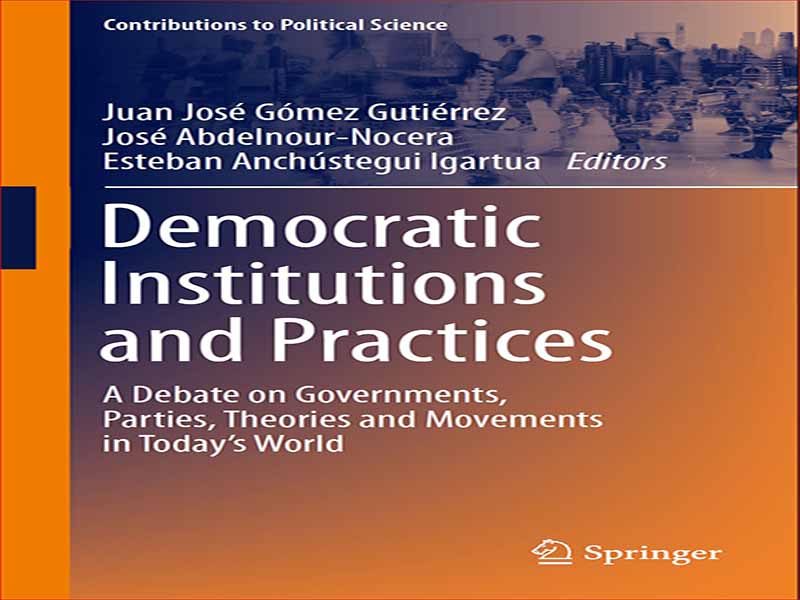- عنوان کتاب: Democratic Institutions and Practices
- نویسنده: Juan José Gómez Gutiérrez
- حوزه: دموکراسی
- سال انتشار: 2022
- تعداد صفحه: 247
- زبان اصلی: انگلیسی
- نوع فایل: pdf
- حجم فایل: 4.22 مگابایت
این کتاب تاملاتی را درباره جنبههای تاریخی، فلسفی، فنی و نهادی دموکراسیهای معاصر و شکلی که آنها در بحثهای جاری به خود میگیرند، گرد هم میآورد. این شامل وضعیت احزاب سیاسی، تفکیک قوا و حاکمیت قانون، بوروکراسی و شایسته سالاری، برابری و نابرابری، فرد و حقوق او، تبلیغات، تعهد سیاسی و اجماع، و اشکال نهادینه شده و جایگزین مشارکت و حکومت در یک جهان با جریان اطلاعات در مقیاس جهانی و نقش واسطه ای فناوری مشخص می شود. دموکراسی یعنی چه؟ «حکومت مردم، توسط مردم، برای مردم». عبارت معروفی که در سال 1863 توسط آبراهام لینکلن بیان شد، امروزه به راحتی می تواند مورد قبول همه دموکرات ها باشد. دلیل آن این است که فرمول لینکلن نه تنها باشکوه، بلکه مبهم است. کلمات مهمی که با محتوای مهم پر می شوند نامیده می شوند، اما هیچ چیز خاصی وجود ندارد. به نظر می رسد که دموکراسی بین ابهامات، محبت ها و نارضایتی ها وجود دارد. بدیهی است که در هر صورت تعریف آن پیچیده تر از اشاره ساده به «قدرت مردم» یا حاکمیت آنهاست، گرچه این نیز آشکار است که وقتی مردم قدرت ندارند، دموکراسی هم وجود ندارد. البته موارد فوق به این پرسش منتهی می شود که مردم چیست، دارنده دموکراسی از چه لحاظ از سوژه هایی تشکیل می شود که همیشه جایگاه خود را در جریانات سیاسی حفظ می کنند و در عین حال از این افراد تشکیل می شوند. . چگونه دموکراسی در جهانی مانند جهان کنونی که توسط فناوری و اطلاعات تعیین می شود اتفاق می افتد؟ چگونه می توان دموکراسی را در این شرایط گسترش داد و به کمال رساند؟ البته این بحث دستوری بودن نیست. با این حال، ما متوجه شدهایم که همکاران ما – دست اندرکاران فلسفه، علم و تئوری سیاسی، تاریخ اندیشه سیاسی، زبانشناسی و ارتباطات – در ابراز نگرانی خود در مورد شواهد کمبودها و محدودیتها در دموکراسیهای معاصر و نیاز، همزمان هستند. تعیین معیارهایی برای ارزیابی سلامت دموکراتیک جوامع ما. به طور خاص، بسیاری از مشارکت ها موافق هستند که اشکال نهادی دموکراتیک کنونی به طور کامل رسالت خود را انجام نمی دهند. از این امر نه تنها تأملاتی در مورد شکل و رویههای مناسب، بلکه در مورد چگونگی در نظر گرفتن دارندگان حقوق دموکراتیک و ابزارهایی که باید از طریق آنها در سیاست به عنوان سوژههای فعال در نظر گرفته شوند، به دست میآید.
This book brings together reflections on historical, philosophical, technical and insti-tutional aspects of contemporary democracies and the form they take in current debates. This includes the status of political parties, the separation of powers and the rule of law, bureaucracy and meritocracy, equality and inequality, the individual and his rights, propaganda, political commitment and consensus, and institutionalised and alternative forms of participation and governance in a world characterised by information flows on a global scale and the mediative role of technology.
What does democracy mean? “Government of the people, by the people, for the people”. The famous phrase, uttered by Abraham Lincoln in 1863, could easily be accepted by all democrats today. The reason is that Lincoln’s formula is not only magnificent, but also vague. Important words called to be filled with important content, but there are no specifics. It seems that democracy exists between ambigui-ties, affections and disaffections. It is evident, in any case, that its definition is more complex than a simple reference to the “power of the people” or their sovereignty, although it is also evident that, when the people do not have power, there is no democracy. The foregoing, of course, leads to the question of what the people is, in what terms is the holder of democracy made up of subjects who always maintain their status as such in political processes and are, at the same time, made up of these.
How does democracy happen in a world like the current one, determined by technology and information? How can democracy be extended and perfected in these conditions? Of course, this is not about being prescriptive. We have noticed, however, that our collaborators—practitioners of philosophy, science and political theory, the history of political thought, linguistics, and communication—coincide in expressing their concern about the evidence of deficits and limitations in contempo-rary democracies and the need to establish criteria to assess the democratic health of our societies. Specifically, many of the contributions agree that the current demo-cratic institutional forms do not fully fulfil their mission. From this follows not only reflections on the appropriate form and procedures, but also on how to consider the holders of democratic rights and the means by which they must participate in politics as active subjects.
این کتاب را میتوانید از لینک زیر بصورت رایگان دانلود کنید:
Download: Democratic Institutions and Practices




































نظرات کاربران